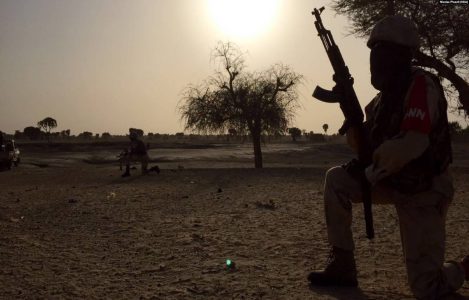
How Boko Haram regained the initiative and what Nigerian authorities should do to stop it?
For years, Nigeria’s political leaders claimed victory against the insurgent group Boko Haram. The most recent to do so was Nigerian Information Minister Lai Mohammed, who in October reiterated the government’s longstanding stance that Boko Haram was “technically defeated.”
To a certain extent, Mohammed has a point. It’s true that Boko Haram has been battered and factionalized. The group controls less territory and has claimed far fewer lives than it did in 2014 and 2015, when it was declared the world’s deadliest terrorist group.
However, these claims of victory are premature. Attacks and casualties have recently risen. Insurgents have caused 750 security force casualties in 2019, close to double that of any prior year. Despite what senior leaders say, many officials appear to be finally waking up to the fact that the threat posed by Boko Haram is real and persistent.
At a meeting of state governors, security chiefs, traditional rulers, academics, and community leaders, the consensus was that defeating the group will take longer than anticipated. Lt. Gen. Tukur Buratai, Nigeria’s army chief of staff, recently admitted that “Boko Haram and the likes cannot be defeated by kinetic military warfare alone.”
Nigerian authorities have won various battles against Boko Haram — but they have not won the peace. As a result, the insurgency continues. What’s more, the government’s constant declarations of victory against Boko Haram show they’re not interested in translating military success into an enduring political settlement. There are no quick fixes.
Institutional reforms that will likely take decades are needed to improve popular legitimacy and adopt an approach to managing the insurgency that is led by locals and civilians as much as security forces. The insurgency’s gains in 2019 and the growing realization within Nigerian political circles that the war will not be over any time soon provide a window of opportunity for authorities to recalibrate popular expectations and undertake needed reforms.
For the most part, Boko Haram has remained out of the headlines ever since. Between 2016 and 2018, around 2,000 people per year were killed as a result of the conflict, a fifth of the total of 2015. Where before the group had conducted attacks across much of northeastern Nigeria, now its operations are more centered squared around Lake Chad.
Boko Haram has now split into two main factions. One faction remains aligned with Shekau and appears to be centered in the Sambisa forest that begins near Maiduguri, Borno State’s regional capitol, and extends into Cameroon.
The other, often referred to as the Islamic State West Africa Province, was until recently commanded by Mohammed Yusuf’s son Abu Musab al-Barnawi and officially sanctioned by the Islamic State. It reportedly commands up to 5,000 fighters, three times that of Shekau’s faction, and its operations are centered farther north, around Lake Chad.
The main cause of the split lies in a dispute over how the insurgent group should treat civilians. Shekau’s tactics and methods were deemed too brutal even for the Islamic State. Instead of the massacres, suicide bombings, and kidnappings, Islamic State West Africa Province has focused on attacking state security forces and civilians who collaborate with them. In the areas it controls, it provides dispute resolution services, micro-loans to local youth and farmers, Islamic education and health care, and public services that are better than what much of the civilian population received under previous state governments. While ruthless, it’s actually capable of providing public goods.
The evidence suggests that Boko Haram has recently focused more of its attacks on state targets. In 2014 and 2015, three quarters of Boko Haram attacks targeted civilians, according to data from the Nigeria Security Tracker.
Since 2016, Boko Haram attacks have targeted civilians less than two thirds of the time and in 2019, the number of clashes with the state and civilian attacks have been roughly even. Among those attacks explicitly credited to the al-Barnawi faction, a majority (61 percent) have involved clashes with the state.
Source: War On The Rocks





